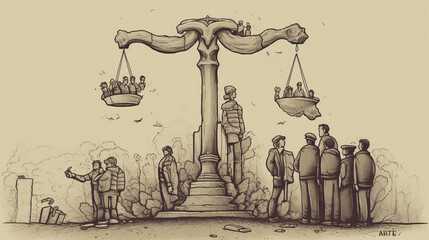
22-Jul-2024 , Updated on 7/22/2024 10:56:01 PM
If judges misuse their judicial power, is it a threat to Indian Democracy?
An essential component of any country's democratic structure is the judiciary. As the custodian of the Constitution of India, the judiciary makes sure that laws and policies uphold the fundamental values of justice, liberty, equality, and fraternity. Nonetheless, judges abusing their authority can seriously jeopardize Indian democracy. The consequences of such misuse are examined in this article, along with how it impacts the rule of law, erodes public trust, and upsets the balance of power.
The Role of the Judiciary in Indian Democracy
The autonomous Indian judiciary is entrusted with upholding constitutional rights, interpreting the law, and dispensing justice without fear or favor. The preservation of the balance of power between the legislative, executive, and judicial branches depends on its independence. By preventing any one branch from growing too strong, the division of powers protects the democratic system.
Judicial Misuse of Power: Definition and Forms
Judges who operate above their constitutionally mandated authority due to personal bias, corruption, or political influence are said to be engaging in judicial misuse of power. This abuse can take many different forms:
- Judicial Overreach: When judges unduly meddle in matters within the legislative and executive branches.
- Judicial Activism vs. Judicial Restraint: Finding the right balance between appropriate involvement and overstepping bounds is the goal of judicial activism vs. restraint.
- Nepotism and corruption: Making decisions that are motivated more by self-interest than by fairness.
- Willful Misinterpretation of the Law: Bending the law to suit one's own purposes.
Implications for Indian Democracy
Undermining the Rule of Law
A fundamental component of democracy is the rule of law, which guarantees that all people and institutions are bound by the law. This idea is violated when judges abuse their authority, producing biased and arbitrary rulings that weaken the rule of law. As a result, there is an environment of unpredictability and unfairness and laws are subject to manipulation by those in positions of authority.
Erosion of Public Trust
The legitimacy of the legal system depends on the public's faith in the courts. The public loses faith in the judiciary's capacity to administer fair justice when judges abuse their authority. When people lose faith in the justice system and the social compact collapses due to a lack of confidence, there may be political upheaval and a compromised democracy.
Threat to the Balance of Power
The delicate balance of power between the three departments of government can be upset by the abuse of judicial authority. Power struggles and disputes can result from judicial overreach, which occurs when judges intrude on the duties of the executive and legislative branches. This endangers the democratic concept of checks and balances in addition to impeding the government's ability to operate effectively.
Encouraging Corruption and Nepotism
The judiciary's corruption and nepotism may have a significant negative impact on democracy. The integrity of the legal system is weakened when judges make decisions that are affected by their own financial or personal interests. This might result in a climate of impunity where powerful people and organizations can avoid responsibility, further solidifying corruption in the system.
Case Studies: Instances of Judicial Misuse
The 1975 Emergency and Judicial Complicity
In India, one of the most notorious cases of judicial abuse of authority took place during the Emergency era (1975–1977). The judiciary—especially the Supreme Court—was perceived as participating in the government's harsh policies that restricted civil freedoms and basic rights. A dark era in Indian judicial history is frequently highlighted in relation to the Supreme Court's decision in the ADM Jabalpur case, which declared that individuals could not seek enforcement of their basic rights under the Emergency.
The Sabarimala Case
Overturning a centuries-old custom, the Supreme Court decided in the 2018 Sabarimala case that women of all ages should be permitted to join the Sabarimala shrine. Although many saw the ruling as a positive step toward gender equality, there was also a great deal of criticism and resentment. Critics pointed to the conflict between judicial meddling and cultural sensitivity, claiming that the court had overreached its bounds by meddling in religious rituals.
Safeguards and Reforms to Prevent Judicial Misuse
Strengthening Judicial Accountability
Strong procedures for judicial accountability are necessary to stop the abuse of authority. This covers open procedures for the selection, relocation, and dismissal of judges. Integrity within the judiciary may be preserved by the creation of an impartial monitoring agency to look into claims of wrongdoing.
Promoting Judicial Independence
The necessity for judicial independence must be balanced with the importance of accountability. Fair and impartial justice depends on ensuring judges are free to act without undue influence from the executive branch, the legislature, or any outside forces. This covers sufficient financing, tenure security, and defense against arbitrary dismissal.
Enhancing Transparency
Increased openness in legal procedures can promote public confidence and discourage the abuse of authority. This entails opening up court records and rulings to the public and putting changes into place to speed up the legal system and cut down on delays.
Encouraging Judicial Restraint
It is crucial to foster a culture of judicial restraint in which justices are aware of their constitutional bounds and the boundaries of their power. Programs for judicial education and training may place a strong emphasis on the value of moderation and the risks associated with overreaching.
Conclusion
India's democracy is seriously threatened by the abuse of judicial power, which erodes public confidence, upends the rule of law, and upsets the balance of power. Strong protections and changes must be in place to stop abuse, even if the court is vital to upholding constitutional rights and administering justice. The integrity of the judiciary and the survival of Indian democracy may be safeguarded by bolstering judicial responsibility, fostering independence, improving openness, and encouraging judicial restraint. A just and equitable society requires individuals to be watchful and involved, as well as all arms of government to be committed to democratic norms.

Student
I'm a final-year law student with a passion for writing. I possess a proven track record of producing well-crafted, error-free, and engaging content. My writing style is versatile, allowing me to adapt to various tones and formats, whether it's informative blog posts, persuasive marketing copy, or technical articles. I have 3 of experience in content writing and have completed projects for a diverse range of clients and industries.
Join Our Newsletter
Subscribe to our newsletter to receive emails about new views posts, releases and updates.
Copyright 2010 - 2026 MindStick Software Pvt. Ltd. All Rights Reserved Privacy Policy | Terms & Conditions | Cookie Policy